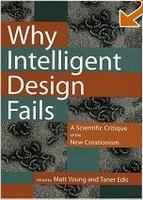 for 'The Emperor's New Clothes, Part 2': The Challenge of Irreducible Complexity' by Michael J. Behe is touted as an "Intelligent Design position statement" by its author. Sadly, it's neither intelligent, nor evidential in the way the author intends.
for 'The Emperor's New Clothes, Part 2': The Challenge of Irreducible Complexity' by Michael J. Behe is touted as an "Intelligent Design position statement" by its author. Sadly, it's neither intelligent, nor evidential in the way the author intends. How can we decide [says Behe] whether Darwinian natural selection can account for the amazing complexity that exists at the molecular level? Darwin himself set the standard when he acknowledged, "If it could be demonstrated that any complex organ existed which could not possibly have been formed by numerous, successive, slight modifications, my theory would absolutely break down." Some systems seem very difficult to form by such successive modifications -- I call them irreducibly complex.That's really the crux of his argument. As an argument it's poor, and it sets up a false alternative: either Darwin or Behe's Creator. But we don't even need to point out the logical error he's committing, because as we see Behe fails even to get his argument off the ground:
Irreducibly complex systems appear very unlikely to be produced by numerous, successive, slight modifications of prior systems, [says Behe] because any precursor that was missing a crucial part could not function. Natural selection can only choose among systems that are already working, so the existence in nature of irreducibly complex biological systems poses a powerful challenge to Darwinian theory.Blah, blah, blah, blah, blah. H. Allen Orr responds to this nonsense rather too politely:
Behe's colossal mistake is that, in rejecting these possibilities, he concludes that no Darwinian solution remains. But one does. It is this: An irreducibly complex system can be built gradually by adding parts that, while initially just advantageous, become - because of later changes - essential. The logic is very simple. Some part (A) initially does some job (and not very well, perhaps). Another part (B) later gets added because it helps A. This new part isn't essential, it merely improves things. But later on, A (or something else) may change in such a way that B now becomes indispensable. This process continues as further parts get folded into the system. And at the end of the day, many parts may all be requiredOrr is too polite because Darwin himself explained this process with regard to the human eye. The eye, he conceded, might at first sight be considered too complex to have been formed by natural selection. However,

Science has proved Darwin right on this point as on every other. As James Watson explains, evolution is not a Theory, it is a Law. As the youngsters say on such matters, "Deal with it."if numerous gradations from a perfect and complex eye to one very imperfect and simple, each grade being useful to its possessor, can be shown to exist; if further, the eye does vary ever so slightly, and the variations be inherited, which is certainly the case; and if any variation or modification in the organ be ever useful to an animal under changing conditions of life, then the difficulty of believing that a perfect and complex eye could be formed by natural selection, though insuperable by our imagination, can hardly be considered real.
This is Part 2 of a three-part series concluding tomorrow. Part 1 is here. Part 3 is here.
[UPDATE: Links fixed. Please explore the links before commenting -- you will find many of your questions are already answered there.]
11 comments:
Why, maybe the irreducibly complex thing just popped into being for no reason, a la the intelligent designer.
Even if life had an infinitesimally small chance of being created, for all we know there could be an infinite number of big bangs, making the possibility of life forming 1.
"for all we know there could be an infinite number of big bangs"
great. that's exactly what we wanted - more non-falsifiable conjecture.
thanks.
Just as unprovable as God, but it still wins, what with not being subject to vicious infinite regression and all.
heh. you've lost me now:
what do you mean by vicious infinite regression?
You guys are pre-empting part 3 with your questions. :))
As the wise old uni lecturers say, it's the intelligent students who asked the questions that are answered next in the notes. :-)
Creationism has cost me, in part, a romantic relationship. Bastards.
FYI, One of your links in this post (Science has "proved Darwin right") isn't working.
I'd be careful of making claims such as 'Science has proved Darwin right;' Evolution by Natural Selection has survived numerous tests and thus makes it a very good hypothesis but that doesn't mean it couldn't be falsified next week. We're not confirmationists, you know.
Oh, and I'd take Watson with a pinch of salt; he's often seen as an extremist in biology and, despite his great accomplishments, is not a goood guide to what the consensus views in biology are. Evolution by Natural Selection is a theory in just the same way that everything else in the scientific paradigm is theoretical.
It's just that it happens to be one of the best theories we've got and some of us are just a little unashamedly proud of it...
"I'd be careful of making claims such as 'Science has proved Darwin right..."
You'd be an advocate then that all knowledge is only 'contingently' true until proven otherwise? On what basis could you even act if this were true? -- and indeed, on what basis could you even make that claim if the claim itself were true.
All knowledge is contextual -- true within the given context -- and there's nothing wrong with recognising that about which you are able to be contextually certain: these things are contextual absolutes upon which you can rely.
If you say evolution is 'just a theory' then that puts it on a par with the nonsense of ID, which is not 'just another theory' but a load of mythic hogwash. The two do not have equal standing.
So, with that context, I can say that I've been ~very~ careful in everything I;ve said. :-)
BTW, you say Anon that "It's just that it happens to be one of the best theories we've got and some of us are just a little unashamedly proud of it..." As you should be. But who exactly is 'us,' Anon? ;^)
So far it's a bit disappointing PC. Let me throw you a few challenges which you might like to address:
1. If you see Boeing 747, and you're a neanderthaler: wouldn't you conclude it was made by the gods? Note here that I'm just turning that argument about lightning around. The kind of arguments you're using work both ways.
2. Do you think that, in principle, would it be possible to conclude that a Boeing 747 was designed (created by God if you so will), or evolved?
3. More generally, do you think it is, in principle, possible to distinguish between things that evolve, and things that have been designed?
4. People usually do not distinguish between adaption (fact) and evolution. The latter being defined as the generation of NEW functionality. Evolution could be a fact, if it could be demonstrated in a laboratory. Why not evolve a fruit fly into a frog?
5. Why is it that fossils remain essentially static? They appear 300 million years ago, disappear 300 million years later and show no sign of evolution at all.
6. The eye consists of 2500 genes. Is there already an explanation why a single eye gene can be advantageous if all of them are needed to make the eye?
7. Saying adding bits that have some advantage, and after doing that for a while, some new functionality has been evolved, doesn't make it so. It's an interesting explanation. It isn't science. No one has demonstrated that in the lab. That's all most evolutionists do these days: it could have worked this or that. But where's the proof? I thought that was what science was all about.
8. Men and chimps have about 96% of genetic material in common.
Let us assume that 5 million years ago we had a common ancestor. Let's assume that the chimp hasn't changed that much, but we did. We have 120 million base pairs of difference with a chimp. Given 5 million years, this means that we need to evolve 120 million base pairs in this time. Let's assume 4 generations per 100 years. That gives us 200,000 generations.
Every generation must change 600 base pairs to end up with modern human. This either must happen in every descendant at the same time, or the change must be so advantageous that it will outbreed every existing human.
How likely do you find this scenario?
As it it is claimed that man was created in the image of God then therefore God must look rather a lot like a monkey then ...no Berend!?
phil howison, "the fossils are static" is from Stephen J. Gould.
Post a Comment